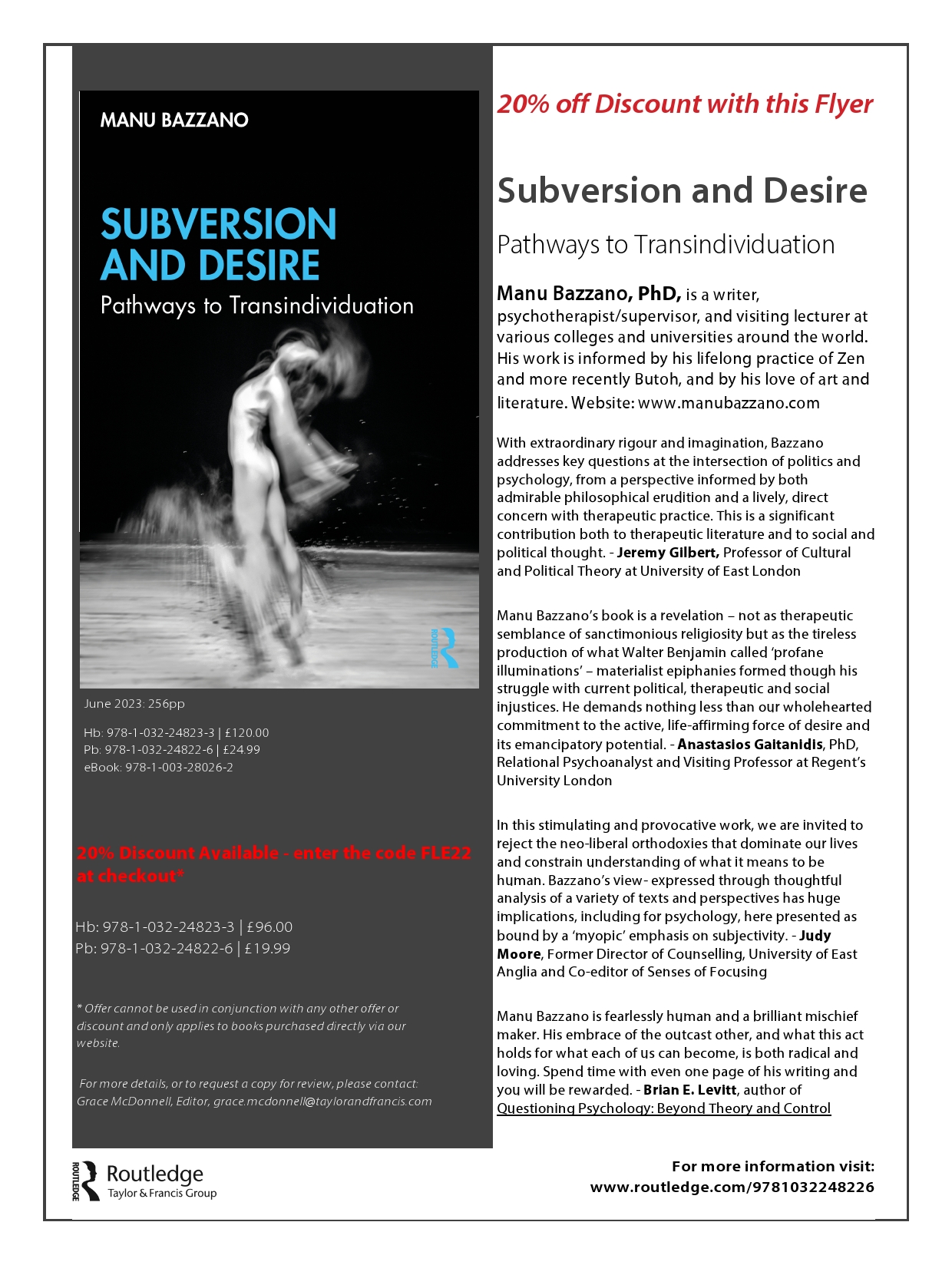
Nietzsche and Psychotherapy

Drawing on over a century of international Nietzschean scholarship, this groundbreaking book discusses some of the unexplored psychological reaches of Nietzsche’s thought, as well as their implications for psychotherapeutic practice. Nietzsche’s philosophy anticipated some of the most innovative cultural movements of the last century, from expressionism and surrealism to psychoanalysis, humanistic psychology and phenomenology. But his work on psychology often remains discarded, despite its many insights. Addressing this oversight, and in an age of managerialism and evidence-based practice, this book helps to redefine psychotherapy as an experiment that explores the limits and intricacies of human experience. It builds the foundations for a differentialist psychology: a life-affirming project that can deal squarely with the challenges, joys and sorrows of being human. Nietzsche and Psychotherapy will be of great interest to researchers interested in the relationship between psychotherapy and philosophy, Nietzschean scholars, as well as to clinicians grappling with the challenges of working in the so-called “post-truth” age.
Re-Visioning Existential Therapy:
Counter-traditional Perspectives

Re-Visioning Existential Therapy is a collection of essays from leading practitioners and theorists around the globe which questions some of the key tenets of traditional existential therapy. The book enlightens, stimulates, and provokes the reader out of complacency. It expands the breadth and scope of the approach, discusses recent developments in psychotherapy and philosophy, and aligns existential therapy to a progressive, radical, and counter-traditional ethos. Through clinical studies, personal reflections, discussions on aspects of theory, and exciting links to art, literature, and contemporary culture, these very diverse and wide-ranging contributions take existential therapy into the fertile wilderness of shared experience. Through renewed links to seminal writers, it captures the subversive spirit, the deep compassion, the unflinching gaze and playfulness that is at the heart of the approach. The book will share knowledge and enthusiasm for the practice of existential therapy in order to encourage therapists and trainees to partake of the joys and challenges of existential practice.
Re-Visioning Person-Centred Therapy
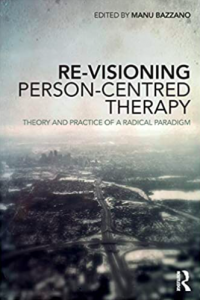
By exploring various ways to assimilate recent progressive developments and to renew its vital links with its radical roots, Re-Visioning Person-Centred Therapy: Theory and Practice of a Radical Paradigm takes a fresh look at this revolutionary therapeutic approach. Bringing together leading figures in PCT and new writers from around the world, the essays in this book create fertile links with phenomenology, meditation and spirituality, critical theory, contemporary thought and culture, and philosophy of science. In doing so, they create an outline that renews and re-visions person-centred therapy’s radical paradigm, providing fertile material in both theory and practice. Shot through with clinical studies, vignettes and in-depth discussions on aspects of theory, Re-Visioning Person-Centred Therapy will be stimulating reading for therapists in training and practice, as well as those interested in the development of PCT.
Zen and Therapy:
Heretical Perspectives
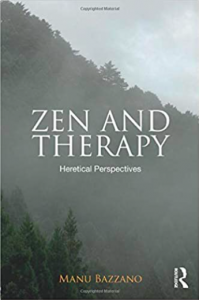
Zen and Therapy brings together aspects of the Buddhist tradition, contemporary western therapy and western philosophy. By combining insightful anecdotes from the Zen tradition with clinical studies, discussions of current psychotherapy theory and forays into art, film, literature and philosophy, Manu Bazzano integrates Zen Buddhist practice with psychotherapy and psychology. This book successfully expands the existing dialogue on the integration of Buddhism, psychology and philosophy, highlighting areas that have been neglected and bypassed. It explores a third way between the two dominant modalities, the religious and the secular, a positively ambivalent stance rooted in embodied practice, and the cultivation of compassion and active perplexity. It presents a life-affirming view: the wonder, beauty and complexity of being human. Intended for both experienced practitioners and beginners in the fields of psychotherapy and philosophy, Zen and Therapy provides an enlightening and engaging exploration of a previously underexplored area.
Therapy and the Counter-tradition:
the Edge of Philosophy

Therapy & the Counter-tradition: The Edge of Philosophy brings together leading exponents of contemporary psychotherapy, philosophers and writers, to explore how philosophical ideas may inform therapy work. Each author discusses a particular philosopher who has influenced their life and therapeutic practice, while questioning how counselling and psychotherapy can address human ‘wholeness’, despite the ascendancy of rationality, regulation and diagnosis. It also seeks to acknowledge the distinct lack of philosophical input and education in counselling and psychotherapy training. The chapters are rooted in the Counter-Tradition, whose diverse manifestations include humanism, skepticism, fideism, as well as the opening of philosophy and psychology to poetry and the arts. This collection of thought-provoking essays will help open the discussion within the psychological therapies, by providing therapists with critical philosophical references, which will help broaden their knowledge and the scope of their practice. Therapy & the Counter-tradition: The Edge of Philosophy will be of interest to mental health professionals, practitioners, counselling and psychotherapy trainees and trainers, and academics tutoring or studying psychology. It will also appeal to those interested in psychology, meditation, personal development and philosophy.
Buddha is Dead:
Nietzsche and the Dawn of European Zen
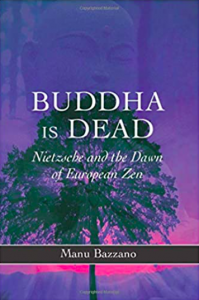
Drawing on Zen as well as on Nietzsche’s thought and its ramifications in and for western culture, this book is a fervent call for a re-visioning of philosophy as vocation. The author is critical of the status quo and committed to intellectual integrity; the result is a creative and adventurous enterprise which is no longer exclusively identified with academia or with the methodology of logic. Filtered through Nietzsche’s hammer – by which he sounded out gods old and new – Buddhism in the West can avoid the pitfalls which emerged during its gestation period in the 20th century, such as: otherworldly spiritualism, conservatism, and denial of the body. The philosophy and the psychology of European Zen advocated by Manu Bazzano in Buddha is Dead: Nietzsche and the Dawn of European Zen is an unconditional affirmation of living and dying. It is an extraordinary fertile viewpoint that will be appreciated by all those who are interested in Eastern philosophy and religions, and who seek life affirming wisdom.
After Mindfulness:
New Perspectives on Psychology and Meditation
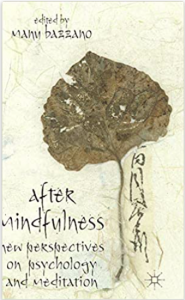
The Mindfulness phenomenon has swept the mental health field over the last two decades, helping to bring some of Buddhism’s more inaccessible doctrines to a broader audience. While it would be naïve to think that our instinctive human longing for the sacred can be satisfied by a diet of weekly exercises, cognitive rewiring and behavioural reprogramming, it would be equally naïve to depend on ‘trans-personal’ and ‘spiritual’ guides to provide us with a pocket-sized map of our own path. Instead, we each create a path as we walk. After Mindfulness brings together well-known Buddhist writers and renowned therapists and theorists from various orientations for an appreciation and critical evaluation of Mindfulness. This unprecedented collection of expertise, ranging from clinical work to inspired commentaries on the Buddha’s teachings, will greatly inspire anyone who is interested in the creative integration of psychology and meditation.
Spectre of the Stranger:
towards a Phenomenology of Hospitality
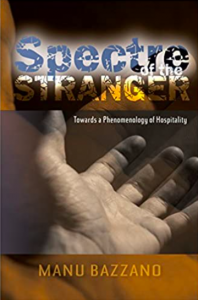
Manu Bazzano engages with identity, otherness and ethics in a wide-ranging discussion of hospitality, exploring various social and political implications. Identity is examined primarily through the experience of Buddhist meditation, understood as phenomenological enquiry, as an exploration aimed at clarifying the non-substantiality of the self, the fluid nature of identity, and the contingent nature of existence. Otherness is discussed using insights from philosophy and psychology. The book retraces the origins of collective forms of malaise such as fanatical patriotism and xenophobia, both legacies of monotheism – the cult of an exclusivist deity. It looks critically at the notions of covenant, territory, kinship and nation, and formulates the view of “nation-state” as expansion of the ego (Buber) and as imagined community. Symbolic and aesthetic dimensions provide a necessary humanistic perspective – the context of demands imposed by others and the phenomenological means to accommodate frames of reference of different religious, philosophical and scientific systems. And herein the author provides a revealing alternative – poetry – which promotes the opening up of new vistas, emancipation and radical change: Hölderlin spoke of “dwelling poetically on the earth”. Throughout, the author engages with philosophy/religion from antiquity till today, and from East to West, thus providing an historic overview of how hospitality goes to the core of psychological well-being.
Introduction to the book
Review of the book in Therapy Today
Zen Poems

Editor Manu Bazzano has put together a charming mix of poets writing in short forms. Here you’ll find poems by Emily Dickinson next to Basho’s haiku along with the best from contemporary Japanese and English authors .. The sections are divided in the Japanese style – according to the seasons beginning traditionally with spring. The sumi-e artwork of old masters continues the oriental feel of the book in spite of containing the poems of René Char, e.e. cummings, Friedrich Hölderlin, Denise Levertov, Garcia Lorca and William Shakespeare. It is refreshing to see English language poetry being reorganized and presented in a new and exciting manner. While most editors of such anthologies in North America would have shied away from adding to such illustrious names, those of authors from the current haiku scene, Manu Bazzano trusted his own good taste enough to not only make a who’s who of current writers, but also to pick excellent work from each of them. By keeping the poetry uppermost in his mind, and following the seasons, the works flow from one to another with just enough dissonance to make the reading lively.
Haiku for Lovers
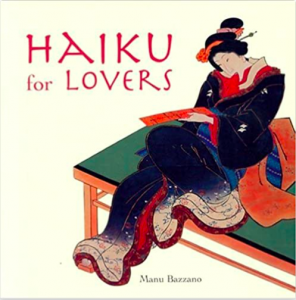
Again MQ Publications brings an anthology of haiku edited by Manu Bazzano, but this is their biggest and best collaboration. In Haiku for Lovers are compiled haiku written by both ancient and modern authors as well as translations of haiku written in a wide variety of other languages. The haiku reflect all the stages of love from first desire, doubts and fears, fires and the erotic, to the dying flames of longing and remembrance. The book is divided into the sections: Honeymoon, Bittersweet, and Harmony. Anyone who has ever loved will find haiku that evoke some phase that he or she has lived through. It is interesting how when we first learned of haiku we were told that passion and sex was not a suitable subject matter for haiku but thankfully the writers of haiku have chosen to ignore this “rule” and have written from the heart and given us the fullness of this book. This book is so rich with poems and with graphics, it is not meant to be read all at once. Each page needs to be savored alone with its wildly divergent fonts and tasteful graphics from old Japanese prints and patterns. Sprinkled throughout are full color reproductions of famous Japanese artwork to enrich and delight the reader. Here you will find haiku from names you know and people you would ike to know more about. Many excellent haiku by everyone from Basho to the names in the latest issue of Lynx or any haiku magazine. Bazzano has done his homework and has searched out every nook and cranny for the best haiku on the subject of love with scrupulous credits and has written very wise and entertaining essays for the division pages. Haiku for Lovers is a beautifully made book, and is a marvelous gift for that person you love for Valentine Day.
Buddha e’ morto:
Nietzsche e l’Aurora dello Zen europeo
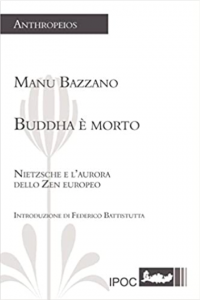
A differenza della maggioranza dei libri attuali che esplorano paralleli fra idee buddiste e occidentali (per lo più nel campo della psicologia e della psicoterapia) Buddha è morto non si occupa della scoperta rassicurante di intuizioni fra loro simili, bensì del radicalismo, del non conformismo e dell’enfasi sull’onestà e integrità che puntella gli elementi più provocatori nelle due tradizioni: da una parte il buddismo (e in particolare lo Zen) e dall’altra la tradizione (o per meglio dire l’anti-tradizione) che nella filosofia occidentale ha il suo esponente più esultante in Nietzsche. Un’opera che riafferma gli attributi creativi del dubbio. Stephen Batchelor, autore di Il Buddismo senza Fedi

The Speed of Angels

‘During one sleepless night, the night of All Saints Day before the dawn of the Day of the Dead, the protagonist of this powerful novella wrestles with a cast of inner demons. The ghosts of the dead are never far away; whether dead relatives or dead philosophers. How far they can help him resolve the existential pain occasioned by lost love we find out, as we go through the night with him, witnessing his struggle to understand his experience’. (Carole Satyamurti)
Il perpetuo principiante
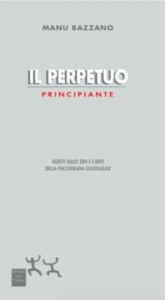
Scritti sullo Zen e l’arte della psicoterapia esistenziale. L’esperienza raccolta in questo testo è particolarmente preziosa perché permette al lettore di confrontarsi in maniera non generica con che cosa stia avvenendo nell’incontro degli insegnamenti buddhisti con il mondo globalizzato e in particolare nel campo della psicoterapia

Chi ama lo straniero:
Verso una fenomenologia dell’ospitalita’
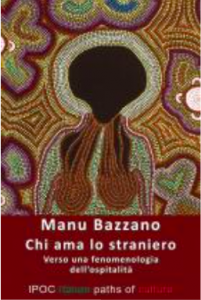
Uno spettro si aggira per l’Europa: – lo spettro del migrante. La figura del profugo contemporaneo, di chi sceglie di lasciare il paese d’origine o è forzato a far ciò dalle circostanze economiche create dal capitalismo globale, è diventato, nella percezione della psiche collettiva, insalubre e malevola, osteggiata da chi nel contempo si commuove nel guardare documentari televisivi sui profughi del passato. Le nazioni-stato hanno sistematicamente ignorato elementari diritti umani e abbandonato i diseredati alle proprie responsabilità. Gli intellettuali, un tempo esuli e pronti a rivelare verità scomode, hanno tradito il loro compito e sono diventati portavoce del pregiudizio crudele della doxa e del populismo dei loro governanti. L’etica radicale e’ risposta estetica volta a riequilibrare l’ingiustizia del potere e a incanalare l’infinita’ del desiderio. Animata dalla bellezza e dalla giustizia, trasgredendo le leggi oggi dominanti dell’utilitarismo, l’etica risponde incessantemente all’eccesso della bellezza rifiutandosi di implodere nella colpa e nel pietismo. Suoi strumenti sono la fenomenologia, l’arte, la meditazione, la rivolta anarchica non-violenta. Soprattutto, la creazione di un nuovo soggetto che inietti poesia nella prosa del mondo.

